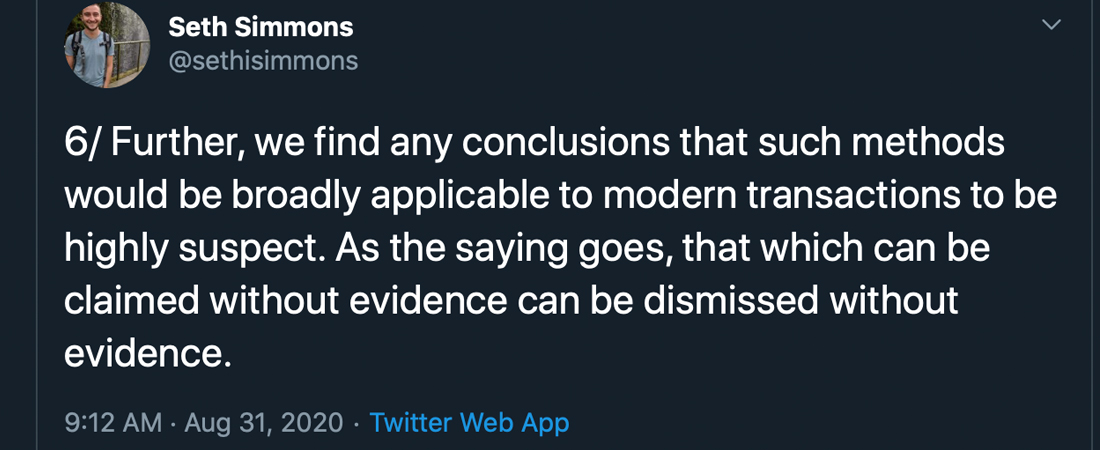
The blockchain surveillance agency Ciphertrace claims to have created the “world’s first” monero tracing instruments for legislation enforcement. In accordance with the corporate announcement, Ciphertrace developed forensic instruments for the U.S. Division of Homeland Safety (DHS) in an effort to observe illicit monero transactions. Regardless of the agency’s claims, there may be zero proof offered that show the corporate really has such instruments.
Because the open-source cryptocurrency was first invoked in 2014, the Monero (XMR) mission has been heralded for privacy-centric strategies. The digital asset community makes use of enforced privateness for all transactions by leveraging ideas like ring signatures, bulletproofs, and stealth (one-time) addresses.
Because of the privacy-centric enhancements, the digital foreign money XMR has gained notoriety on darknet markets (DNM), as monero represents an incredible share of DNM transactions.
Nevertheless, Ciphertrace, a blockchain intelligence agency that works with world legislation enforcement and regulators, claims it has a instrument that may “trace and visualize Monero transaction flows.”
“Ciphertrace developed tools to explore monero transactions to assist in investigations,” the agency detailed in a press launch on August 31. “These tools include transaction search, exploration, and visualization tools for Monero transaction flows that have been integrated with CipherTrace’s Inspector financial investigations product. This provides ways to track stolen Monero currencies or Monero currencies used in illegal transactions.”
Ciphertrace notes that monero is represented on 45% of all DNMs and calls it the “second-favorite cryptocurrency of choice among criminals.” Dave Jevans, CEO of Ciphertrace says that whereas individuals suppose it’s practically unimaginable to establish true sources, the corporate has been working for a 12 months finding out the Monero community.
Jevans reveals the corporate has created instruments for legislation enforcement to assist uncover unlawful monero transactions however there’s nonetheless numerous work that must be finished.
“Monero (XMR) is one of the most privacy-oriented cryptocurrencies,” Jevans burdened. “Our research and development team worked for a year on developing techniques for providing financial investigators with analysis tools. There is much work still to be done, but Ciphertrace is proud to announce the world’s first Monero tracing capability. We are grateful for the support of the Department of Homeland Security’s Science & Technology Directorate on this project.”
Nevertheless, the press launch offered by Ciphertace printed on August 31, 2020, gives zero proof of any monero-tracing instruments. The announcement is merely a declare that the corporate has such instruments, however there are only a few causes offered within the announcement to imagine it.

Regardless of the announcement, crypto-community members have a tough time believing that Ciphertrace really has a grasp at monitoring XMR transactions. “There’s no reason to believe that Ciphertrace has discovered a substantially novel or effective method of tracing Monero transactions,” one particular person wrote on Twitter.
Monero proponent and data safety engineer, Seth Simmons, additionally didn’t imagine Ciphertrace’s newest announcement.
“There is no reason to think there is anything novel going on here until proven otherwise,” Simmons tweeted. “The most likely answer is they’re using methods developed *by the Monero community to improve Monero* to de-anonymize some specific transactions with external data. The Monero community has long been at the forefront of privacy research in an effort to build stronger tools, as evidenced by the ‘Breaking Monero’ series.”
Simmons continued with a scathing critique of Ciphertrace’s alleged tracing instrument statements within the press launch and highlights there are “numerous errors in the understanding of Monero in the article.”
“Without details, there isn’t really anything to discuss. Some vague information provided by Ciphertrace in this article is not possible without external data (like KYC information from exchanges),” the monero proponent mentioned.
What do you concentrate on the alleged instruments Ciphertrace claims to have in opposition to monero’s transaction privateness? Tell us within the feedback part beneath.
Picture Credit: Shutterstock, Pixabay, Wiki Commons
Disclaimer: This text is for informational functions solely. It isn’t a direct supply or solicitation of a suggestion to purchase or promote, or a suggestion or endorsement of any merchandise, providers, or firms. Fintech Zoom doesn’t present funding, tax, authorized, or accounting recommendation. Neither the corporate nor the creator is accountable, straight or not directly, for any injury or loss prompted or alleged to be brought on by or in reference to the usage of or reliance on any content material, items or providers talked about on this article.
